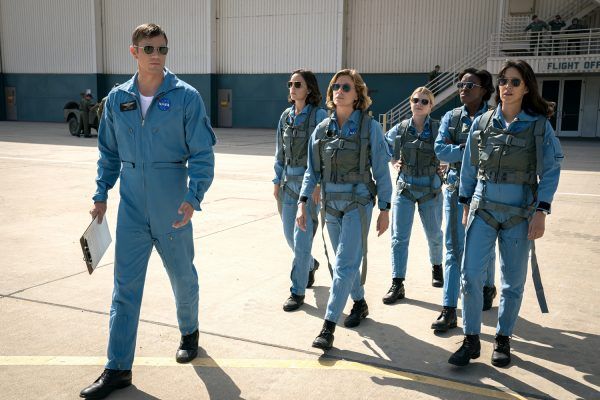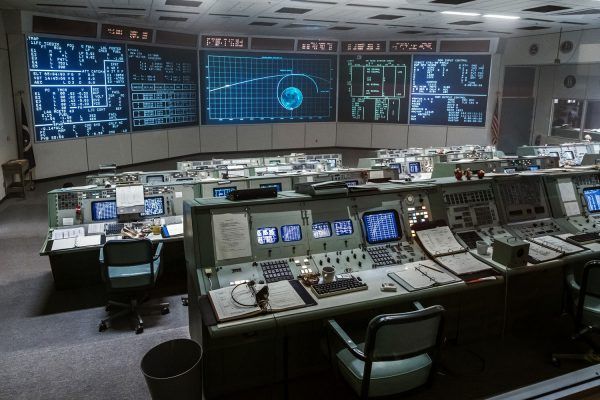What did we lose when we stopped caring about space exploration? Mankind's quest into the final frontier has long been one of humanity's most ambitious and aspirational pursuits, and if there's one thing that recent space epics like Gravity and First Man make clear, it's that human beings were absolutely bonkers to strap themselves to rockets and fly into the great unknown in the first place. But that's what makes it a dazzling act of human ambition and accomplishment.
In the new Apple TV+ series For All Mankind, we get a look at what might have been had the space race never ended, and specifically, had it pointed America's scientific history down a more inclusive path. From Outlander and Battlestar Galactica co-creator Ronald D. Moore, who knows a thing or two about aspirational space dramas after working on several Star Trek series, For All Mankind imagines an alternate history where Russia beat America to the moon in the Space Race. In Moore's vision, the defeat spurs American history down a new path, causing the Nixon administration to double down on our journey to the stars. When Russia adds insult to injury, launching the first woman to the moon just a few short months after their first cosmonaut touches down, For All Mankind follows what might have been if America had invested as much into continued space exploration and the growth of the program as we did in getting there first.
Following that big "what if" of an inciting incident, For All Mankind explores how it would affect the American experience from the perspective of NASA's astronauts and engineers, their families, and the politicians making policy around their advances. At the center of it all is Joel Kinnaman as Edward Baldwin, an early astronaut in the Apollo program, haunted by a mid-test-flight decision not to touch down on the moon that costs America first place, who ultimately becomes a leader in the program to bring women astronauts into NASA. Ever at his support is his wife Karen (Shantel VanSanten), an Army wife turned astro-wife, who buttons up her constant terror and anxiety at her husband's missions with the perfect poise of a proper housewife and mother, polished by her great pride in his accomplishments.
In contrast, we meet Gordo Stevens (Michael Dorman) and Tracy Stevens (Sarah Jones), who find their domestic order transformed when Tracy is selected to become one of the "As-cans", aka "astronaut candidates", in competition to join NASA's ranks. At her side in the program are Molly Cobb (a commanding Sonya Walger), a hardened pilot who tried to crack through NASA's glass ceiling in the past; Ellen Wilson (Jodi Balfour), a wealthy young woman whose personal secrets could compromise her space career; and Danielle Poole (Krys Marshall), a NASA engineer turned space recruit. Each of the key players find a fascinating journey towards self-discovery and fulfillment as they vie to become the first woman on the moon, fundamentally reshaping the course of American history every step of their journey.
Ultimately, that is the great appeal of For All Mankind; it's a very loving, optimistic look at what might have happened had we been compelled to double down on space exploration rather than pulling back the moment we staked our claim on the moon. The series regularly jumps months, and occasionally years, in pursuit of exploring how that change in focus (and funding) could have altered the course of history, and boy, For All Mankind is determined to play it deadly straight.
In fact, that might be the show's biggest disadvantage. For All Mankind takes itself very seriously and moves very slowly despite the time jumps, methodically pacing out the cultural shifts down to minute detail, and rarely surprising with the results, especially in the first half. That said, there are definitely standout moments and fantastic performances -- the fifth episode, "Into the Abyss" delivers some tightly-paced thrills, exploring the mental cost exacted on the spouses our heroic astronauts leave at home, and the seventh episode "Hi Bob" is a wonderful bottle episode.
There's no getting around the fact that For All Mankind is essentially doing Mad Men in NASA, charting the rise of these (mostly unwelcome) women in the workplace. As far as workplace dramas go, the series has moments of sharp and incisive character drama, carried by a generally excellent cast, but -- despite the alt-history -- we've seen this all done before. Similarly, while the series' generous budget is evident, the visual language is peak astronaut drama; beautiful and well-shot, but so very familiar. Being familiar doesn't make For All Mankind bad by any stretch, but for much of its run, you're waiting for it to turn a corner into something as new and uncharted as the realms its characters hope to explore, only to find them touching down second place.
Eight of the first season's ten-episode run were provided for review, and while the series initial struggles with some expository explanations and divergent subplots, it picks up steam once it finds its focus. Especially in the back half of the season, where the characters and their overlapping arcs start to come to life and the series finally veers towards some intriguing (albeit understated) sci-fi leaps to match the socio-political inventions of its alt-history.
Will audiences be willing to sit through the four hours it takes for the series to come alive in an entertainment landscape that's largely defined by an excess of options? That's one of many big gambles Apple TV+ is making in their big streaming launch. But if audiences are willing to stick around, For All Mankind ultimately becomes a gripping, character-driven look at sexism in the workplace, the pressures of American exceptionalism, and how the competition of ideas and individuals can propel scientific advancement to new heights.
Rating: ★★★
For All Mankind will be available exclusively on Apple TV+. For more on Apple's content, check out our reviews for The Morning Show, See, and Dickinson



